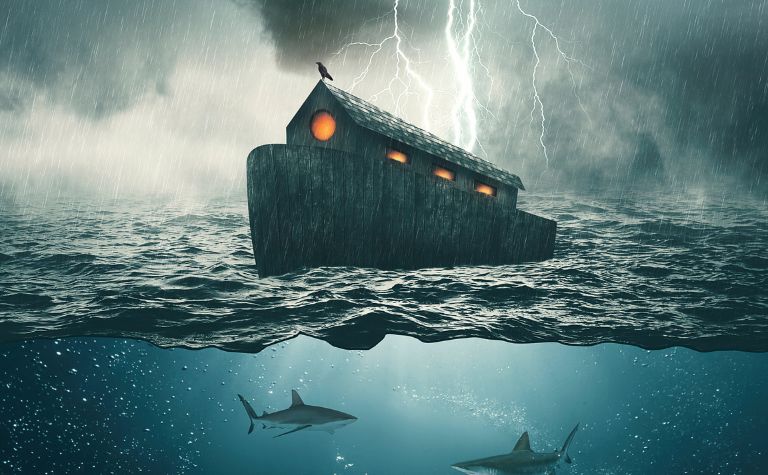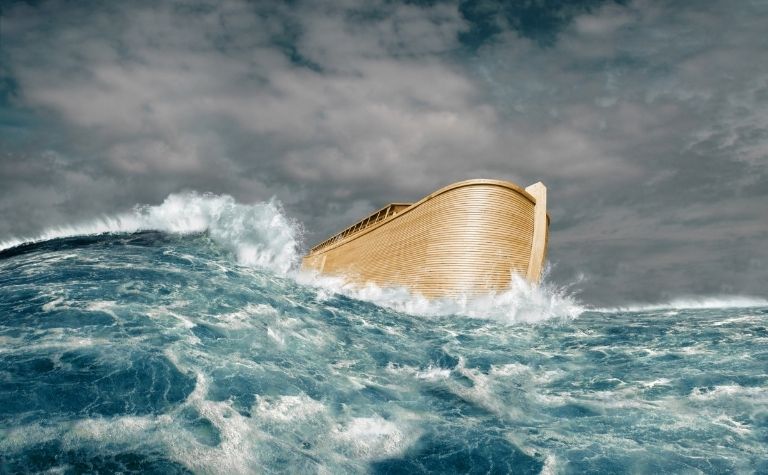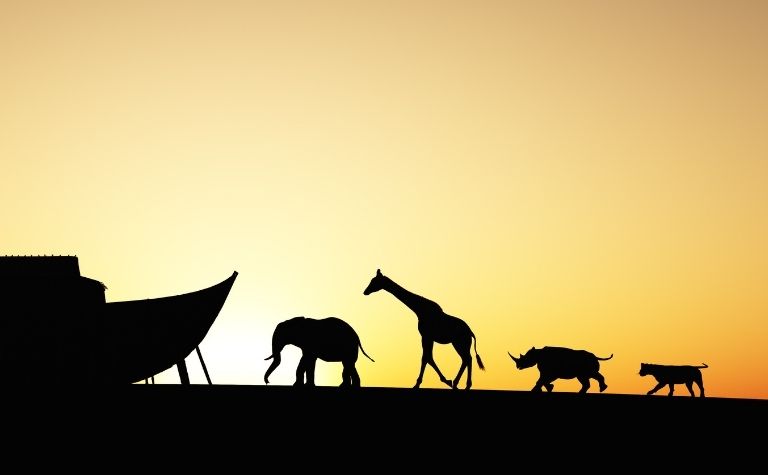The story of Noah and the ark has fascinated Bible readers for millennia. Old and New Testament writers referenced the story, and Jesus mentioned it in his teaching (Matt. 24:37-28). Those who know the story in Genesis are likely familiar with Noah’s family, who is referred to throughout the narrative (Gen. 6-9). One question people ask is if Noah had sons who weren’t onboard the ark.
Genesis mentions that Noah had three sons, Shem, Ham, and Japheth, who were on the ark and survived the flood. The Bible doesn’t say anything about another son that wasn’t onboard the ark, yet some scholars think it’s possible that only the ones that did are mentioned in the story.
Did a nameless son of Noah drown in the flood? What is an example of a scholar who allows for the possibility that Noah had other sons? Could having three sons be a clue to the answer? What does the Bible say about Shem, Ham, and Japheth? Keep reading to learn the answers to these questions and others.
Also see Who Was On the Ark With Noah? to learn more.

Did a nameless son of Noah drown in the flood?
At the beginning of the flood story, Genesis names Noah’s sons: “And Noah had three sons, Shem, Ham, and Japheth” (Gen. 6:10, ESV). At the end of it, the same three sons exit the ark: “The sons of Noah who went forth from the ark were Shem, Ham, and Japheth” (Gen. 9:18). The flood story doesn’t mention any other son of Noah, and neither does the rest of the Bible.
Some Genesis scholars allow for the possibility that the flood story only names the sons of Noah that were on the ark and survived the flood. However, since this is an argument from silence, as the text doesn’t say that he didn’t have other sons, it’s impossible to prove.
Most Genesis commentators don’t speculate about the topic, and those who do, admit the answer is ultimately unknowable. One Genesis scholar writes that the story introduces Noah’s sons “by name as, Shem, Ham, and Japheth, as Noah’s three sons — or at least as the three of his sons who survived the Flood.” [1] The author doesn’t elaborate further on the issue.
Some scholars observe that Genesis only names three sons for multiple patriarchs. [2] For example, Adam, Lamech, and Terah all have three sons. Is this a coincidence, as each man had only three sons? Or do certain themes and patterns shape the stories? If the references to Noah’s sons are purposely edited, then it’s possible that Noah had a son that wasn’t on the ark.
Also see How Many Sons Did Noah Have? to learn more.

Japheth in Genesis
Genesis refers to Japeth as older than Shem. “To Shem also, the father of all the children of Eber, the elder brother of Japheth, children were born” (Gen. 10:21).
Nevertheless, he appears third in some lists of Noah’s sons, like Genesis 6:10, “And Noah had three sons, Shem, Ham, and Japheth” and 9:18, “The sons of Noah who went forth from the ark were Shem, Ham, and Japheth. (Ham was the father of Canaan).”
Like his brothers, Japheth survived the flood (Gen. 7:7). He also helped Shem cover up Noah’s nakedness after the flood (Gen. 9:20-27).
Japheth’s family line
His descendants lived in the tents of Shem, unlike Ham’s (Gen. 9:27). Scholars believe his descendants occupied the isles of the Gentiles, Hellenes, or Greeks, including Asia Minor and northern Greece (Gen. 10:5). [5] The Table of Nations includes the descendants of Japheth. Genesis 10:2-5 reads:
- 2 The sons of Japheth: Gomer, Magog, Madai, Javan, Tubal, Meshech, and Tiras.
- 3 The sons of Gomer: Ashkenaz, Riphath, and Togarmah.
- 4 The sons of Javan: Elishah, Tarshish, Kittim, and Dodanim.
Verse five reads, “From these the coastland peoples spread in their lands, each with his own language, by their clans, in their nations.”
Also see Why Did God Choose Noah? to learn more.

Shem in the Bible
Shem was the second son of Noah. Genesis implies that he was 98 years old when the flood occurred. “These are the generations of Shem. When Shem was 100 years old, he fathered Arpachshad two years after the flood” (Gen. 11:10).
After he fathered Arpachshad, Shem lived another 500 years before he died at the age of 600. “And Shem lived after he fathered Arpachshad 500 years and had other sons and daughters” (Gen. 11:11).
Shem’s family line
In his prophecy regarding future generations, Noah revealed that Japheth’s descendants would live in the tents of Shem, while the Canaanites of Ham’s line wouldn’t.
Genesis 9:25-27 read, “Cursed be Canaan; a servant of servants shall he be to his brothers. He also said, Blessed be the Lord, the God of Shem; and let Canaan be his servant. May God enlarge Japheth, and let him dwell in the tents of Shem, and let Canaan be his servant.”
The Table of Nations mentions Shem’s descendants. Genesis 10:21-22 read,
- 21 To Shem also, the father of all the children of Eber, the elder brother of Japheth, children were born.
- 22 The sons of Shem: Elam, Asshur, Arpachshad, Lud, and Aram.
- 23The sons of Aram: Uz, Hul, Gether, and Mash.
- 24 Arpachshad fathered Shelah; and Shelah fathered Eber.
- 25 To Eber were born two sons: the name of the one was Peleg, for in his days the earth was divided, and his brother’s name was Joktan.
- 26 Joktan fathered Almodad, Sheleph, Hazarmaveth, Jerah,
- 27Hadoram, Uzal, Diklah
- 28 Obal, Abimael, Sheba
- 29 Ophir, Havilah, and Jobab; all these were the sons of Joktan.
- 30 The territory in which they lived extended from Mesha in the direction of Sephar to the hill country of the east.
- 31 These are the sons of Shem, by their clans, their languages, their lands, and their nations.
Also see Who Is Noah in the Bible? to learn more.
Ham in the Bible
Ham was Noah’s youngest son. He was probably born about 96 years before the flood. [4] Ham was the father of the Egyptians, Ethiopians, Libyans, and Canaanites.
The Canaanites play an important role in the Old Testament because they resided in the land that God promised Abraham’s descendants. The Canaanites rejected the God of the Israelites, which created problems for centuries.
The Old Testament sometimes uses the name “Ham” as a reference to the Egyptians. For example, Psalm 78:51 reads, “He struck down every firstborn in Egypt, the firstfruits of their strength in the tents of Ham.”
Ham’s family line
The Table of Nations mentions Ham’s descendants. Genesis 10:6-14 reads,
- 6 The sons of Ham: Cush, Egypt, Put, and Canaan.
- 7 The sons of Cush: Seba, Havilah, Sabtah, Raamah, and Sabteca.
- The sons of Raamah: Sheba and Dedan.
- 8 Cush fathered Nimrod; he was the first on earth to be a mighty man.
- 9 He was a mighty hunter before the LORD. Therefore it is said, “Like Nimrod a mighty hunter before the LORD.”
- 10 The beginning of his kingdom was Babel, Erech, Accad, and Calneh, in the land of Shinar.
- 11 From that land he went into Assyria and built Nineveh, Rehoboth-Ir, Calah, and
- 12 Resen between Nineveh and Calah; that is the great city.
- 13 Egypt fathered Ludim, Anamim, Lehabim, Naphtuhim
- 14 Pathrusim, Casluhim (from whom the Philistines came), and Caphtorim.
Also see When Was Noah Born? to learn more.
References:
[1] The Genesis Record by Henry Morris. p. 179.
[2] Genesis 1-11:26 by Kenneth Mathews. p. 359.
Related Questions
The ancestry of Jesus Christ is important to the New Testament Gospels. Knowing who Jesus came from helps readers understand who he is. Two of the four Gospels -- Matthew and Luke -- even include...
For many Bible readers, the story of Noah's ark never gets old. They are in awe when they read about the magnitude of the floodwaters, thankful when imagining how God saved the animals, and hopeful...
